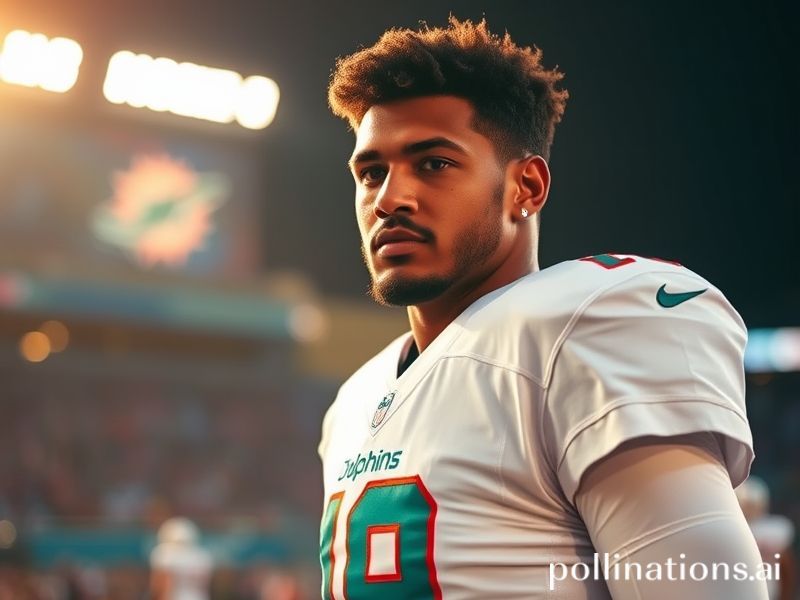From Palmetto Bay to the Planet: How Skylar Thompson Became the World’s Most Unlikely Geopolitical Metaphor
Skylar Thompson and the Global Gladiator Complex
≈600 words
If you had told a Roman centurion that two millennia later the fate of empires would hinge on whether a 27-year-old from Palmetto Bay, Florida, could throw an inflated bladder past eleven highly paid mercenaries in body armor, he would have laughed, then reached for his gladius. Yet here we are: the Miami Dolphins’ third-string quarterback—yes, Skylar Thompson—now sits at the unlikely intersection of American soft power, global supply chains, and the planet’s most expensive soap opera.
Consider the broadcast footprint. When Thompson trotted in against the Jets last October, the feed ricocheted from low-orbit satellites operated by Luxembourgish holding companies, through under-sea cables guarded by Filipino cybersecurity teams, onto 4-K screens in Riyadh sports bars where the clientele sip non-alcoholic beer and pretend not to be hung over from illicit gin. One incomplete pass in MetLife Stadium triggers a groan audible from Reykjavik to Jakarta. The NFL’s international revenue just crossed US$2 billion annually; Thompson’s QBR is, therefore, a leading indicator tracked by analysts at Deutsche Bank alongside copper futures and Ukrainian wheat yields.
Meanwhile, the jersey on his back is stitched in an El Salvador maquiladora from polyester pellets whose polymer chain begins life as Qatari natural gas. When Thompson scrambles and tears that jersey, replacement inventory is air-freighted via Dubai, where the same cargo planes sometimes carry humanitarian aid and sometimes carry gold bars for whichever junta couped most recently. Nothing personal, Skylar—just global commerce doing its daily Cirque du Soleil act on a tightrope made of dental floss.
Of course, the quarterback himself remains blissfully unaware that he has become a geopolitical Rorschach test. In Manila, sports-talk radio hosts tout him as proof that grit trumps pedigree, conveniently ignoring that American grit is usually subsidized by US$450 million stadium deals. In Berlin, leftist podcasts dissect his concussion protocol as late-stage capitalism commodifying brain trauma; the hosts drink fair-trade coffee and record on MacBooks assembled by workers whose own gray matter is seldom mentioned. Down in Buenos Aires, kids wearing knockoff Dolphins caps imitate his throwing motion between power cuts, unaware that the rolling blackouts are caused by creditors who also finance the league’s streaming rights. The world watches America’s gladiator complex the way earlier eras watched the British Navy: equal parts aspiration, resentment, and popcorn.
What makes Thompson perfect for this role is his essential mediocrity. He is not Patrick Mahomes, whose brilliance would break the ironic frame; nor is he a total washout, which would be too depressing even for Europeans. He is, instead, the statistical embodiment of “good enough to dream, bad enough to worry”—a human cliffhanger that keeps 180 countries bingeing like it’s the final season of a show no one admits to liking. Every third-down conversion becomes a referendum on meritocracy, late capitalism, and whether the universe has a sense of humor (spoiler: it does, and it’s dark).
Naturally, the brand managers have noticed. A Tokyo fashion label just dropped a limited-edition “Thompson’s Ladder” hoodie—distressed teal, retail US$320—whose marketing copy references “ascending chaos.” One suspects the copywriter has never been sacked by a 285-pound edge rusher, but existential dread sells in Shibuya the way canned tuna sells in bomb shelters.
Where does it end? Probably not in triumph. Historically, feel-good third-stringers finish the season on injured reserve while the franchise drafts another savior with a stronger arm and fewer concussive memories. But the beauty lies in the interim: a brief, brightly lit moment when a human middle manager in cleats becomes the planet’s collective metaphor for hoping against data. The satellites keep humming, the polymers keep polymerizing, and somewhere a kid in Lagos toggles between Thompson highlight reels and videos of flooding that used to be coastline.
So raise whatever beverage your local tax code permits. Here’s to Skylar Thompson—our improbable, disposable avatar of global dissonance—reminding us that in the 21st century even the benchwarmers are multinationals. May his next pass travel far enough to let us forget, for three seconds, the bill coming due.







